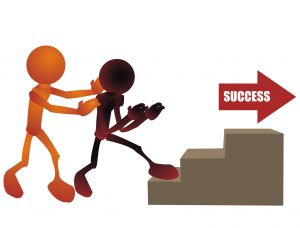Does your boss find you proactive…or pushy?
 [We’re pleased to welcome Gerhard Blickle and Andreas Wihler, both of the University of Bonn. Drs. Blickle and Wihler, collaborated with B. Parker Ellen III, Wayne A. Hochwarter, and Gerald R. Ferris – all of Florida State University – on their article recently published in Journal of Management entitled “Personal Initiative and Job Performance Evaluations: Role of Political Skill in Opportunity Recognition and Capitalization.”]
[We’re pleased to welcome Gerhard Blickle and Andreas Wihler, both of the University of Bonn. Drs. Blickle and Wihler, collaborated with B. Parker Ellen III, Wayne A. Hochwarter, and Gerald R. Ferris – all of Florida State University – on their article recently published in Journal of Management entitled “Personal Initiative and Job Performance Evaluations: Role of Political Skill in Opportunity Recognition and Capitalization.”]
Those wishing to prove themselves as “doers” must not only be hands-on and demonstrate proactive behavior but also have social acumen and a feel for favorable opportunities. Those who rely on personal initiative alone will quickly be standing there as an isolated troublemaker. This is what psychologists from the University of Bonn and their colleagues from Florida State University (USA) have discovered through surveying a variety of occupational categories. The results have been published online in Journal of Management.
Quickly write up the summary for the new project, solicit agreement from the business partners and then submit a proposed solution to the boss for the complicated financing for the project – anyone who wants to be a “doer” has to demonstrate personal initiative above all. This also becomes clear in job advertisements, because 87 percent of employers demand these proactive skills from their applicants. But personal initiative by itself is of no benefit – it has to be combined with social acumen in order to bring about success. We conducted a survey amongst employees, colleagues and their supervisors to come to this conclusion.
While personal initiative is an absolute requirement for a professional career for self-employed professionals and entrepreneurs, employees are not always met with approval from the boss if they take the reins on their own. Anyone taking personal initiative should first make certain that one’s own activities are also actually desired. Anyone who doesn’t do this is frequently considered to be a troublemaker. But how will employees know whether their proactive behavior is welcome? And how can one influence whether one’s own actions will be received positively by the supervisor?
Our international team of researchers focused on these questions in a total of three studies. The first study involved 146 employees with their supervisors from a wide variety of fields. Standardized tests were used to survey the extent to which the employees themselves took the initiative for action and had social acumen: How well are colleagues’ emotions and plans perceived and classified? Is communication efficient? The questions also focused on the ability to react appropriately to the respective situation. Together, the employee and supervisor estimate how receptive the respective company is to proactive behavior. Result: An atmosphere conducive to personal initiative led to additional positive economic results only if the person has a marked degree of social acumen.
In the second study, a questionnaire was used to ask 143 employed participants about their skill in utilizing favorable opportunities for changes through carefully selected behaviors. In addition, personal initiative was assessed in turn and the employee’s performance was evaluated by the supervisor. Result: The personal initiative demonstrated led to better performance appraisals if the skill regarding correct behaviors was pronounced.
In the third iteration, the interaction of social acumen and a feel for the appropriate moment was recorded jointly by 219 employees. As before, the researchers again asked about the company’s receptiveness to proactive behavior and evaluated the personal initiative demonstrated in the test. Along with employees and supervisors, colleagues were also included in the survey this time. The result confirms the previous findings: A positive atmosphere for proactive behavior only leads to good performance appraisals if the participants demonstrated a high degree of personal initiative as well as social acumen and sensitivity to the right opportunity.
This consequently means that appropriate identification of favorable opportunities and the ability to adapt to the respective situation are important preconditions for skillfully putting personal initiative behaviors into place. Many companies wished for employees with personal initiative, for good reason. But this skill by itself has no impact. Organizations could strengthen their position by improving their employees’ social acumen through training measures and promoting an atmosphere of personal initiative.
You can read “Personal Initiative and Job Performance Evaluations: Role of Political Skill in Opportunity Recognition and Capitalization” from Journal of Management by clicking here. Want to know about all the latest research from Journal of Management? Click here to sign up for e-alerts!
 Andreas Wihler received his doctorate in I&O-psychology at the University of Bonn, Germany. He received his MSc in Psychology in 2010 at the University of Bonn. His research focuses on personal initiative, leadership, and personality in organizations. He has published in peer reviewed journals such as Journal of Organizational Behavior and Leadership Quarterly.
Andreas Wihler received his doctorate in I&O-psychology at the University of Bonn, Germany. He received his MSc in Psychology in 2010 at the University of Bonn. His research focuses on personal initiative, leadership, and personality in organizations. He has published in peer reviewed journals such as Journal of Organizational Behavior and Leadership Quarterly.
 Gerhard Blickle, PhD, is a Professor of Work & Organizational Psychology at the University of Bonn, Germany. He received his PhD in Psychology in 1993 from the University of Heidelberg. He has published in peer reviewed journals such as the Journal of Organizational Behavior, Leadership Quarterly, and International Journal of Selection and Assessment.
Gerhard Blickle, PhD, is a Professor of Work & Organizational Psychology at the University of Bonn, Germany. He received his PhD in Psychology in 1993 from the University of Heidelberg. He has published in peer reviewed journals such as the Journal of Organizational Behavior, Leadership Quarterly, and International Journal of Selection and Assessment.
 B. Parker Ellen III is a fourth year PhD Candidate in Business Administration at Florida State University. He researches and teaches topics in organizational behavior, primarily related to social influence. His areas of interest are leadership, organizational politics, accountability, and teams. This summer, he’ll be moving to Boston, Massachusetts to join the Management and Organizational Development faculty in Northeastern University’s D’Amore-McKim School of Business.
B. Parker Ellen III is a fourth year PhD Candidate in Business Administration at Florida State University. He researches and teaches topics in organizational behavior, primarily related to social influence. His areas of interest are leadership, organizational politics, accountability, and teams. This summer, he’ll be moving to Boston, Massachusetts to join the Management and Organizational Development faculty in Northeastern University’s D’Amore-McKim School of Business.
 Wayne A. Hochwarter is a Jim Moran Professor of Management at Florida State University. He received a Ph.D. in Organizational Behavior from Florida State University, and has been on the faculties at Mississippi State University and the University of Alabama. He has published articles in highly-regarded journals such as Administrative Science Quarterly, the Journal of Applied Psychology, and the Journal of Vocational Behavior. He has also had research findings showcased in the BusinessWeek, Inc., MacLean’s, and Entrepreneur, as well as over 100 domestic and international newspapers.
Wayne A. Hochwarter is a Jim Moran Professor of Management at Florida State University. He received a Ph.D. in Organizational Behavior from Florida State University, and has been on the faculties at Mississippi State University and the University of Alabama. He has published articles in highly-regarded journals such as Administrative Science Quarterly, the Journal of Applied Psychology, and the Journal of Vocational Behavior. He has also had research findings showcased in the BusinessWeek, Inc., MacLean’s, and Entrepreneur, as well as over 100 domestic and international newspapers.
 Gerald R. Ferris is the Francis Eppes Professor of Management and Professor of Psychology at Florida State University. He is a Fellow of the American Psychological Association, the Society for Industrial and Organizational Psychology, and the American Psychological Society. He founded and served as editor of the annual series Research in Personnel and Human Resources Management from its origin in 1981 until 2003. In 2001, he was the recipient of the Heneman Career Achievement Award, and in 2010 he received the Thomas A. Mahoney Mentoring Award, both from the Human Resources Division of the Academy of Management.
Gerald R. Ferris is the Francis Eppes Professor of Management and Professor of Psychology at Florida State University. He is a Fellow of the American Psychological Association, the Society for Industrial and Organizational Psychology, and the American Psychological Society. He founded and served as editor of the annual series Research in Personnel and Human Resources Management from its origin in 1981 until 2003. In 2001, he was the recipient of the Heneman Career Achievement Award, and in 2010 he received the Thomas A. Mahoney Mentoring Award, both from the Human Resources Division of the Academy of Management.



























































































